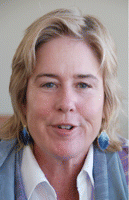New Challenges Await Psychiatrist Used to Difficult Assignments
Abstract
The big windows in her office overlooking the intersection of Florida and New York avenues, which form the mundane gateway to the capital of the free world, are a long way from the rutted roads of Somalia or the Green Zone in Baghdad.

Elspeth Cameron Ritchie, M.D., M.P.H.: This is a big, complex job, and I like big, complex jobs."
Elspeth Cameron Ritchie, M.D., M.P.H., retired as a U.S. Army colonel several months ago after a 24-year career as a military psychiatrist. Her new job is chief clinical officer of the District of Columbia's Department of Mental Health.
"I like challenges," she said during an interview in her new office, still sparsely decorated. "This is a big, complex job, and I like big, complex jobs."
It was also a kind of homecoming for Ritchie ("Cam" to those who know her). She grew up in Washington, D.C., before going off to Harvard as an undergraduate and then to George Washington University for medical school. After graduation she completed a residency at Walter Reed Army Medical Center.
Ritchie came from a family with a long military tradition. Both grandfathers were in World War II. Her father fought in the Korean War, and her stepfather served there as a medic.
She has always seen psychiatry in its broader settings.
"I like looking at human beings acting in the context of their community," she said. "How do people act in groups, and what makes them successful or not? What are the therapeutic interventions—not necessarily medications—that enhance their sense of belonging to an organization?"
Ritchie spent a year as division psychiatrist for the 2nd Infantry Division in Korea, the first woman to hold that position.
After another stint at Walter Reed, she served for four months in early 1993 as executive officer with the 528th combat Stress Control Unit in Mogadishu, Somalia.
There, she conducted stress-management classes for the troops to give them a forum to discuss what they encountered and their reactions to it and to help them develop effective ways of coping, said Ritchie.
Her experience in Somalia illustrated the complexities of conducting military psychiatry in the field.
She stabilized one soldier with psychotic delusions on psychotropic medications but he had to be evacuated, for example, while a second soldier, hallucinating because of cerebral malaria, was treated for that disease and eventually returned to duty.
Ritchie returned to Walter Reed for a forensic psychiatry fellowship. She later earned her M.P.H. and was the first disaster psychiatry fellow at the Uniformed Services University of the Health Sciences in Bethesda, Md.
After the September 11, 2001, attack on the Pentagon, she helped set up and run the family-assistance center in a hotel nearby. She also roamed the halls of the Pentagon in the weeks afterward practicing "therapy by walking around."
In 2004, she went to the Office of Army Surgeon General as the psychiatry consultant and in 2007 was named director of the Proponency of Behavioral Health there.
She has also served on APA's Committee on the Psychiatric Dimensions of Disasters and represented APA at meetings in Baghdad that were intended to revive the medical profession in Iraq after the fall of Saddam Hussein.
Battling stigma was perhaps Ritchie's most significant task within the Army's health infrastructure.
"Stigma is a problem in society too, but it's especially true in cultures that value strength," she said.
The problem existed on two levels: policies and personal views, she explained.
For instance, Army regulations stipulated that soldiers taking psychotropic drugs had to be stable on them for three months before they were permitted to deploy to a war zone. However, if that meant missing a deployment with their unit mates, soldiers would often not enter treatment.
Regulations can be changed from the top, but if a sergeant thinks that his men won't follow him if he's seen a psychiatrist, "that's a dynamic that's hard to change," she said.
She knows firsthand the struggles military families experience with extended times away from home.
"Being a female psychiatrist, a mother, and a soldier is complex," she said.
Her husband is an attorney at a federal agency in Washington, D.C., and she has two children, ages 11 and 13.
"It hasn't been easy. Korea and Somalia predated husband and children," she explained.
She did find time to edit "Combat and Operational Behavioral Health," an updated version of the Army's standard textbooks on military psychiatry, published a few months ago.
At her retirement ceremony, Ritchie heard her former boss, Army Surgeon General Lt. Gen. Eric Schoomaker, sum up the effect of her military career.
"Aside from trauma care, no area of military medicine is under greater challenge than behavioral elements of this war," Schoomaker said. "No officer has borne more of the burden to support those efforts than you. The force is far healthier because of the attention you've drawn to behavioral health."
Another side of Ritchie's personality came to light for many at the same event, when she handed out copies of a very different sort of book, one of poetry and essays she had been working on over years in the Army. (Her mother is also a published writer.)
"I've been writing all my professional life," she said. "I've written less poetry lately, just because it grew out of intense clinical experience, and I've had less of that recently."
The last poem in the book sums up her career in Army medicine. In it she says:
I write about Soldiers, but I am one too.
Shot at infrequently, more often simply
sick of sandstorms or missing
home and kids or a cold Diet Coke
Images cross my eyeballs:
the fireballs outside the Pentagon,
taps at Arlington Cemetery,
another burned Iraqi child,
And notes, and smells.
More taps, sweet dung from horses
drawing the caissons of our dead.



